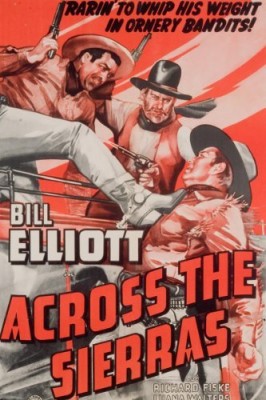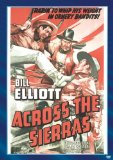| Reviews & Columns |
|
Reviews DVD TV on DVD Blu-ray 4K UHD International DVDs In Theaters Reviews by Studio Video Games Features Collector Series DVDs Easter Egg Database Interviews DVD Talk Radio Feature Articles Columns Anime Talk DVD Savant Horror DVDs The M.O.D. Squad Art House HD Talk Silent DVD
|
DVD Talk Forum |
|
|
| Resources |
|
DVD Price Search Customer Service #'s RCE Info Links |
|
Columns
|
|
|
Across the Sierras
The black and white, full-frame transfer is superb*, very clean with no age-related wear or blemishes, though there are no extra features.
Murderer Mitch Carew (Dick Curtis), having served a six-year prison sentence, returns to the town of Arroyo to gun down the men who sent him up: shopkeeper Dan Woodworth (John Dilson) and former marshal Wild Bill Hickok (Bill Elliott). At Woodworth's general store, Carew goads Dan into drawing his gun first, allowing Carew to legally kill him in "self-defense." Biding his time awaiting Hickok's return, Carew plots a robbery of the Wells Fargo stagecoach while he and his chief henchmen, Stringer (LeRoy Mason), continue terrorizing Woodworth's family: Dan's widow (Ruth Robinson) and their Boston-bred niece, Anne (Luana Walters).
Elsewhere, Hickok is riding into town when he spots Larry (Richard Fiske), a childhood friend, about to be lynched for cattle rustling. Bill rescues him from the angry ranchers (including busy studio bit player Eddie Laughton), even though he thinks Larry just might be guilty. Bill tells Larry that after years of gunfighting he's determined to stake out a homestead and settle down, inviting Larry to join him. However, despite his admiration for Bill, fatalist Larry falls in with Carew and his gang.
Across the Sierras is decent enough but pretty ordinary until about the halfway point. In the first half there's a greater emphasis on the comedy antics of Hickok's pal Cannonball (Dub Taylor), who sings three songs in the film, plays a concertina and later a xylophone (or, as he calls it, a "zillaphone"). There's some rudimentary but amusing slapstick - "Cannonball, will you get away from that flypaper!?" - that the iconic Western movie character actor does reasonably well. Apparently ol' Dub was an accomplished xylophone player in real life, in later years reportedly wowing Johnny Carson and his Tonight Show audience one night. Still, he's far removed from the more familiar supporting player of Bonnie and Clyde, The Wild Bunch, and other films made decades after this.
(Major Spoilers): The picture really takes off in a tense scene two-thirds or so into the film. Bill has tracked the bandits to a remote hideout, where Larry nervously and unsuccessfully tries to get Bill to call off his search. Bill turns to leave when one of the bandits, in the rocks behind Larry, takes a shot at Bill. Bill, turning around fast and seeing only Larry, instinctively and fatally shoots him and not the unseen shooter. Bill realizes his mistake too late though Larry, in his dying breath, insists Bill wasn't to blame. Later, just before the climatic gunfight between Bill and Carew, Bill removes the pistols from his holster, replacing them with Larry's monogrammed pistol instead - a nice touch.
Another interesting twist is the notion of Wild Bill determined to settle down, falling in love with Anne, but then sadly realizing that, essentially, once a gunfighter always a gunfighter. As she plans for their wedding, he admits that he can never make her happy, and ultimately rides off into the sunset, alone.
Bill Elliott had been in movies since the mid-1920s, and his first appearance as Wild Bill Hickok, in a Columbia serial called The Great Adventures of Wild Bill Hickok (1938) led to an eventual if short-lived series. It might have continued, but Elliott moved over to Republic Pictures in 1943, where he played virtually the same role, "Wild Bill Elliott" which also became the actor's official stage name. He then gained his greatest fame playing Red Ryder for two years in the late 1940s opposite Robert (then Bobby) Blake. Elliott has a rather bland, inexpressive face: smooth features, thin lips, receding hairline, but all this is compensated by a quietly commanding voice - one assumes he was big on radio at the same time. ("And you would be wrong," writes Sergei Hasenecz. "Elliott never did the Red Ryder radio show, although Bobby Blake appeared as Little Beaver for a while. I can find no references to Elliott doing any regular radio gig.")
The supporting cast will surprise fans of the Three Stooges. Pock-marked, mustached, and perennially oily-faced Dick Curtis appeared in more than a dozen classic Stooge shorts, perhaps most famously Yes, We Have No Bonanza (1939), in which he played a Western villain rather like this one here. Richard Fiske is also probably best known for his association with Moe, Larry, and Curly, having played their short-fused drill sergeant in Boobs in Arms (1940), among others. You'd never guess that shrill, broadly comic nemesis and the sensitive, doomed youth in Across the Sierras are one and the same. His good performance really comes out of nowhere, at least for those of us familiar with him mainly through his two-reel comedies. Fiske was killed in action in LeCroix, France, two months after D-Day.
Director D. Ross Lederman shows a lot of imagination for the climatic shoot-out, which is shot from interesting angles and, bereft of underscoring, uses Bill's determined footsteps to create palpable, rhythmic tension.
Video & Audio
Across the Sierras is presented in an impressively sharp, clean full-frame transfer free of damage and age-related wear. It's on par with the high standards of Sony's "Columbia Classics" line. There are no menu screens or options at all: insert the disc and it plays the feature automatically. The region-free DVD-R disc's mono audio (English only, with no subtitle options) is acceptable. There are the usual chapter stops every ten minutes but no Extra Features at all.
Parting Thoughts
As with Sony's Durango Kid movies, I'd prefer to see this series in chronological order and I'd rather pay more for a 6- or 12-movie set than buying these very short movies one at a time. However, despite its brevity Across the Sierras is worth it this time: a way-above-average B-Western genre scholars and fans should seek out. Highly Recommended.
* The opening title card lists this as an Astor Films presentation. That company reissued the film in 1948, and that credit may have been cut into the original negative. In any case the film runs 59 minutes and appears complete.
Stuart Galbraith IV's audio commentary for AnimEigo's Tora-san, a DVD boxed set, is on sale now.
|
| Popular Reviews |
| Sponsored Links |
|
|
| Sponsored Links |
|
|
| Release List | Reviews | Shop | Newsletter | Forum | DVD Giveaways | Blu-Ray | Advertise |
|
Copyright 2024 DVDTalk.com All Rights Reserved. Legal Info, Privacy Policy, Terms of Use,
Manage Preferences,
Your Privacy Choices | |||||||















